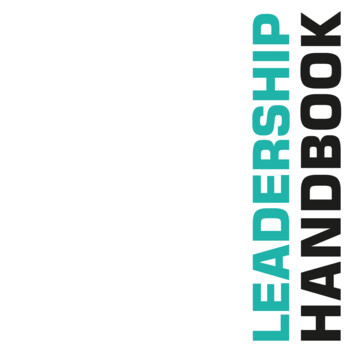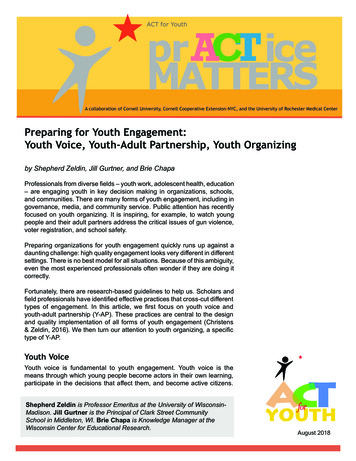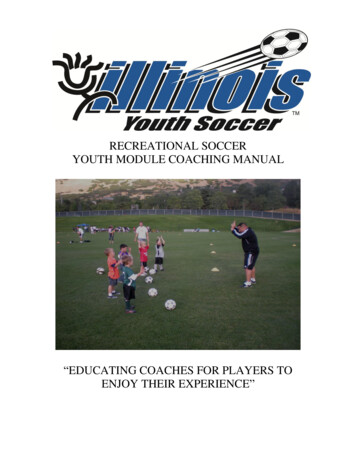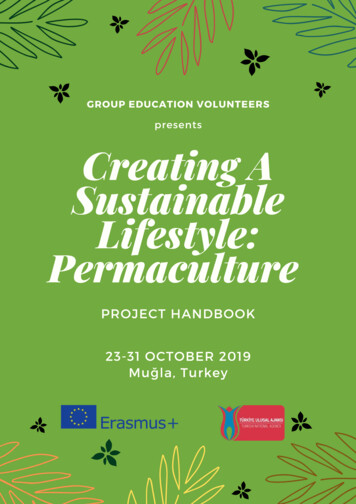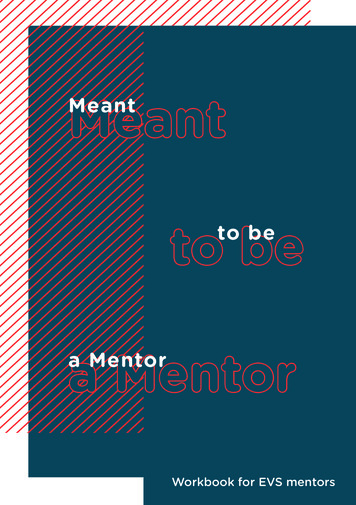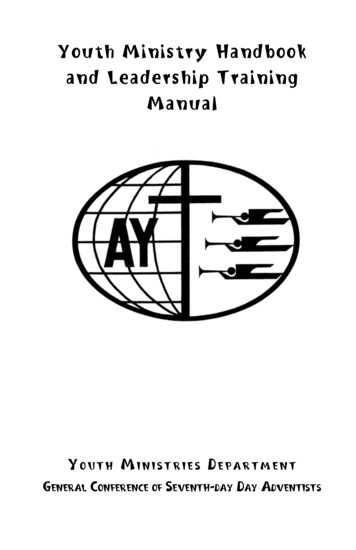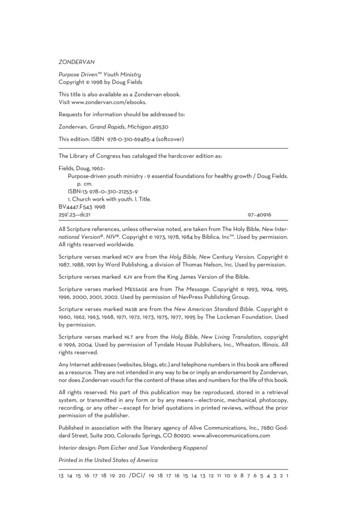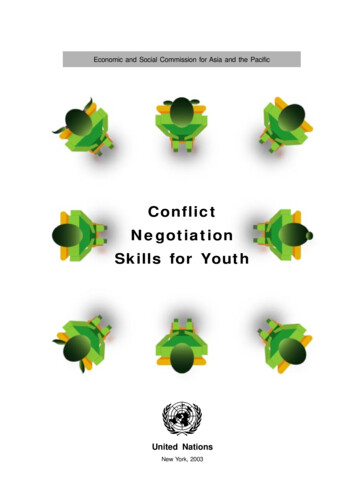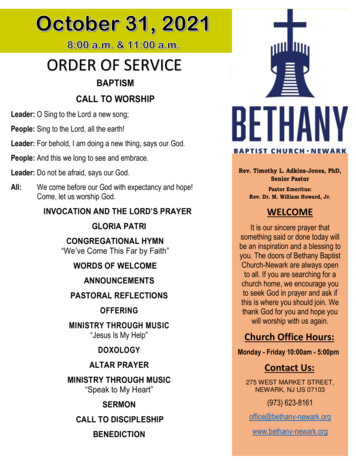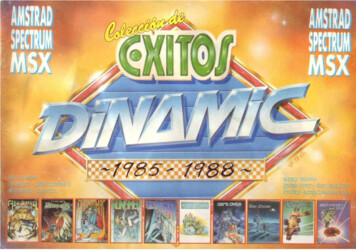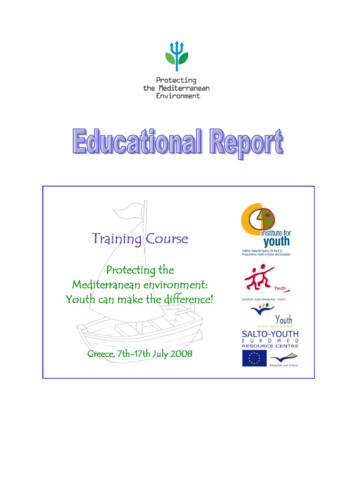
Transcription
INTRODUCTIONThe Training Course “Protecting the Mediterranean Environment: Youth can make adifference!” took place in Athens and Cycladic Islands between July 7th and opment,globalwarming,desertification, water management and other urgent environmental issues arebecoming more and more important on a political level, a core issue for civilsociety and NGOs, a source of worrying for global economy.The protection of the Mediterranean Sea could represent another opportunity tobring both sides together, to foster the cooperation between European countriesand MEDA countries.The Greek and the Cypriot National Agencies for the Youth in Action Programmedesigned the concept of the training course “Protecting the MediterraneanEnvironment: Youth can make a difference!” in cooperation with SALTO EuroMed.In your hands you have the Educational Units of the training course from thestarting point, including the preparation meeting which was held in Athens, 29thMay–1st June 2008 and the implementation of the Training Course, which was heldin Athens and Cycladic Islands from 7th to 17th July 2008.TRAINING TEAMGiuseppe Marletta (Italy), Coordinator of the Training CourseEvi Koutsousirou (Greece), TrainerHaythem Kamel (Egypt), TrainerEmeric Abrignani (France), TrainerBernard Abrignani (France), TrainerORGANIZERSSALTO-YOUTH EuroMed Resource Center, ParisBernard Abrignani, Coordinator of the EuroMed Resource CentreStephanie Henry, SALTO EuroMed Project AssistantGreek National Agency for the YOUTH in Action ProgrammeDora Bei, Head of the Greek National AgencyLaya Tzortzi, TCP OfficerMartha Diamantopolou, TCP OfficerCypriot National Agency for the YOUTH in Action ProgrammeYiannis Yiannakis, Head of the Cypriot National AgencySALTO-YOUTH EuroMed Training Course"Protecting the Mediterranean Environment: youth can make the difference!”Educational ReportththGreece, 7 – 17 July 2008
INDEXINTRODUCTIONTRAINING TEAM AND ORGANIZERS1. PREPARATORY MEETING1.1 Aims and objectives1.2 Programme1.3 Implementation2. PREPARATION OF SELECTED PARTICIPANTS2.1. Identity Cards2.2. My organisation2.3. Research on environmental issues2.4. Hopes and fears3. IMPLEMENTATION OF THE TRAINING COURSE3.1.Course description3.2.Programme3.2.1. Introduction3.2.2. Group dynamics3.2.3. Getting into the topic3.2.4. Getting onboard3.2.5. Presentations of the islands3.2.6. Events and meetings3.2.7. The Vikings3.2.8. Production3.2.9. Partner matching3.2.10. Evaluation4. CONTACT LIST5. ANNEXES5.1.Certificate of attendance5.2.Participants’ researches on environmental issues5.3.Participants’ production5.3.1. EuroMed5.3.2. Environment5.3.3. NewspaperSALTO-YOUTH EuroMed Training Course"Protecting the Mediterranean Environment: youth can make the difference!”Educational ReportththGreece, 7 – 17 July 2008
1. PREPARATORY MEETING1.1 Aims and ObjectivesAimsTo get to know and understand the concept of the TC "Protecting theMediterranean Environment: Youth can make the difference!"To create the organisational and educational frame of the training course.ObjectivesTo introduce and constitute the Training Team of the TCTo finalize the selection of participantsTo divide tasks among the team members.To create the provisional agenda of the TC.To explore all the organizational and logistics aspects, in close cooperationwith the two National Agencies organising the training course.1.2 ProgrammeThe Preparatory Meeting was held in Athens, Divanis Acropolis Hotel, between Maythe 29th and June the 1st 2008.Participants: Bernard Abrignani – Coordinator of SALTO-EURO-MED YOUTH Resource CentreDora Bei, Head of the Greek National AgencyYiannis Yiannakis, Head of the Cypriot National AgencyLayia Tzortzi, TCP Officer, Greek NAMartha Diamantopoulou, TCP Officer, Greek NAGiuseppe Marletta, Coordinator of the Training CourseEvi Koutsospirou, TrainerHaythem Kamel, TrainerDay One – Thursday 29th.Arrival and DinnerDay Two – Friday 30thIntroduction of the training course: rationale, conceptSelection of Participants ILunch in the old centre of PlakaSelection of Participants IIDescription and proposals of some routes the sailing might follow.Reflection on the media and journalists to be involved in the projectSALTO-YOUTH EuroMed Training Course"Protecting the Mediterranean Environment: youth can make the difference!”Educational ReportththGreece, 7 – 17 July 2008
Dinner in the student area of ExarchiaDay Three – Saturday 31stVisit of the sailing boats that will host the TCCoffe break at the Lake of VouliagmeniLunch at the beach of KavouriSelection of Participants IIIReflection on the environmental issues to be tackledProvisional agenda of the trainingDivision of tasks and roles within the teamEvaluation of the prep-meetingDinner at the roof garden of the hotelDay 4 – Sunday 1stDeparture1.3 ImplementationDay One - Thursday 29thDinnerDay Two – Friday 30thGreat time is devoted to the selection of participants.Half of the group of participants is selected among those who applied on the SALTOdatabase with the support of the relevant European NAs and EMYUs.For the rest of the group of participants, the two NAs will work in cooperation withSALTO and the training team to find more participants with the right profile for thisunique training course.Some potential candidates are already identified thanks to personal contact of theparticipants of the prep-meeting with NGOs working in the field who can beinterested in sending participants, with EMYUs and European NAs.Dora ensures that the Greek NA can support the travel costs of some MEDA and EUparticipants.Dora, Layia, Martha, Evi and Yiannis proposed some possible routes the sailingboats might follow in July. This aspect is considered very important because,according to that, the training team will build and adapt the educationalprogramme. Predictions are not easy to do because the path to be done willdepend a lot on the weather conditions.After different proposals, one possible programme can be:Alimos Marina, Athens - Kea - Kythnos - Serifos - Syros - Kea - Alimos MarinaOther possible options can include the island of Mykonos, to reflect upon theenvironmental impact of tourism; Tinos, for its religious value. The Greek NA willfinalize a proposal of the ideal route that the skippers will try to respect,accordingly to sailing and weather needs.Evi will prepare a document with description of the islands where the sailing boatswill possibly dock: trying to identifying aspects relevant to our topics, specificSALTO-YOUTH EuroMed Training Course"Protecting the Mediterranean Environment: youth can make the difference!”Educational ReportththGreece, 7 – 17 July 2008
venues or resource NGOs that can make our stay in the island an educationalresource.Dora describes the philosophy behind this training course, the expected outcomesand the ratio behind some specific events that will take place in the islands.Visibility of the YiA programme, the promotion of this specific project related toenvironmental issues, the structural dialogue between stakeholders, young peopleand environmental NGOs are the main interests of the two NAs supporting the TC.Two specific events will take place.- One in Kea where former Greek EVS volunteers will meet for evaluating theirEuropean Voluntary Service. The training team will be in touch with thefacilitators of the EVS event to try to combine one evening and/or morning.Giuseppe proposes to organise a common dinner and a workshop on the topicof environment facilitated by our participants for the Greek former EVS. Theimplementation of this meeting will depend a lot on the impact of an 8hours long trip (from Athens, Alimos to Kea) on our group. Maybe a rest isabsolutely needed.- The other event will be organised specifically for us and our training in theisland of Syros. A meeting will gather together stakeholders, politicians andexperts in the field of environment who will meet the participants of thetraining course to try to build a structural dialogue, to share aboutenvironment and which is the role that young people and youth NGOs canhave, how a decision-making process in this field can be shared.We reflected on the idea of having 5 journalists following the event, one on eachboat. The ideal composition of the team of journalists is:- One journalist from a Greek national media, possibly MTV.- One journalist from EURONEWS- One journalist from AlJazeera- One journalist from RFI, Radio France International- One journalist from Cyprus.The ambitious media coverage of the project will be ensured also by local ornational journailists who will be invited to follow the events on the differentislands.The Greek NA can also support the media paying the travel costs of the 5journalists (if needed of course!)Day Three – Saturday 31stThe training team discussed on the programme and the activities to be developed.Given the specificity of this unique training, it is impossible create a definitiveprogramme. The weather conditions can affect the whole trip and that is why weneed a flexible educational flow of activities.The programme will proceed as follows:- the day and a half spent in Athens before the sailing will be mainly devotedto group building and sailing instructions/responsibilities)- the training team will prepare subject-specific workshops to beimplemented on board according to the length of the trip or the destination.SALTO-YOUTH EuroMed Training Course"Protecting the Mediterranean Environment: youth can make the difference!”Educational ReportththGreece, 7 – 17 July 2008
The subjects to be tackled are: water management, pollution and its impacton social life, desertification, sustainable development, renewable energies,eco-politics, eco-tourism.- Stops on different, probably five, Greek islands where our participants willdisplay exhibitions, animate workshops, promote campaigns aboutenvironment.- One final day back in Athens for networking activities and evaluation of thewhole training course.We could ask the teams of the 5 boats to facilitate activities for the otherparticipants: treasure hunts, quizzes, etc.One of the red-lines of the training can be the sailor’s diary. The idea has still tobe developed: it could be a personal reflection for those who want to take notes ontheir learning or feeling; it can be an additional tool for the journalists and theirwork; it can also be the outcome of the daily reflection groups.Trainers will be on a constant communication, involving also Emeric who could notattend the preparation meeting. Their communication is essential for sharingresponsibilities and tasks, for preparing the activities.To ensure the involvement of all participants, saving time and avoiding tourists onboard, the team has work a lot on the preparation before the training. Thefollowing ideas should be developed:- having the hopes and fears session before the training- creating a document to investigate on pax’ profile. It could be useful toknow more about them and their skills (gender, origin, sailing skills,cooking .) and divide them on team boats before the training.- starting the group-building activities: asking them to upload photos on theplatform, asking and sharing questions about them (favourite food, music,values, etc.)- developing specific homework to motivate them to research and getting intothe atmosphere of the training. Possible requests can be:o answer to a quiz using the documents we provide them with. Wecould play a bit, including some info about their fellows taken fromthe above-mentioned questions.o Research on environment and environmental policies in their countryor local communitieso The profile of their NGOs (they should also bring material about theNGO to the training)o A project idea to be developed in the framework of the YiAprogramme in the field of environmento The preparation of two games/exercises: a short one or icebreaker; alonger one to be implemented either with other participants or withlocal young people and/or tourists in the islands.A couple of days after the preparation meeting a complete report of the meetingwas submitted to all the actors -organisers and trainers- (including a detailed “todo list) to facilitate the preparation phase and the communication among thedifferent actors.SALTO-YOUTH EuroMed Training Course"Protecting the Mediterranean Environment: youth can make the difference!”Educational ReportththGreece, 7 – 17 July 2008
2. PREPARATION OF PARTICIPANTSThe educational team decided during the prep-meeting to try to start workingbefore the training seminar itself, with an intense preparation phase withparticipants: asking them to complete some specific tasks/assignments.A very useful tool was the SALTO EuroMed e-learning community,www.saltoeuromed-elc.com. This e-community was created by SALTO EuroMedwith the aim of sharing information, resources, data among trainers, the team andthe relevant NAs, between the team and participants, among participants.The e-community contains today:- The photos of the prep-meeting- An “Identity Card” for every participant (including a photo and informationrelated to pax countries, interests, personality)- A document with hopes and fears of participants- A brief presentation of pax NGOs (name, aims, target group, main activities)- Participants researches on environmental issues- Internet links to useful resources in the field of environment- Draft agenda of the seminar- List of participants- Organisational information (e.g. “what to bring on the sailing boats”)2.1. Identity CardsParticipants built their Identity Cards using a format and answering some specificquestions. All identity cards where used on the boats as a “get to know” tool.2.2. My organisationParticipants had the chance to share about their organisations (including targetgroups and aims). It was a useful tool participants and trainers used to understandwhich kind of NGOs and organisations participated to the training event. It was thestarting point for the partner matching session which was held at the end of thetraining course.2.3. Research on environmental issuesTo get familiar with environmental issues participants were asked to make aresearch on one of the following topics:Water managementPollution and its impact on social lifeDesertificationSustainable developmentRenewable energiesEco-politicsEco-tourismAll researches were first uploaded on the SALTO EuroMed e-learning communityand then used during the implementation of the TC.All researches are available in annex 5.2.2.4. Hopes and fearsSALTO-YOUTH EuroMed Training Course"Protecting the Mediterranean Environment: youth can make the difference!”Educational ReportththGreece, 7 – 17 July 2008
Participants shared about their hopes, expectations and fears related to thetraining course. All documents with hopes and fears were uploaded on the SALTOEuroMed e-learning community.SALTO-YOUTH EuroMed Training Course"Protecting the Mediterranean Environment: youth can make the difference!”Educational ReportththGreece, 7 – 17 July 2008
3. IMPLEMENTATION OF THE TRAINING COURSE3.1. Course description(as it appears in the SALTO-EuroMed website).35 participants coming from European and MEDA countries join an itinerant trainingcourse on 5 different sailboats around Greek Cycladic Islands. They experiencestrong team-building activities, learn from sessions on environmental issues,produce an itinerant exhibition to be shown during the big events organised in allthe islands where sailboats stop, animate workshops and non-formal sessions duringthese events.Aims- To raise awareness on the protection of the Mediterranean environment- To foster competences on how the Youth in Action and the EuroMedprogrammes can be used in this field- To enhance active citizenship through the creation of structural dialoguebetween participants and stakeholders on environmental issueObjectives- To learn about concrete contribution to global sustainable development,with a special focus on the Euro-Mediterranean area- To strengthen participants’ initiative and creativity- To stimulate networking, improving quality and quantity of youth projectson environmental issues- To exchange good practicesProfile of participantsThe course is for youth workers and youth leaders who:are between 20 and 30 years oldare experienced in the Euro-Med YOUTH Programme and/or Youth in ActionProgrammeare open to share and enrich their knowledge and awareness regardingenvironmental issuesare committed to co-operate during the preparation phase before theimplementation of the training course according to the team of trainers’requests (writing articles, making researches, etc.)are supported by their organisations and have a concrete interest inimplementing a Euro-Med project on environmental issuesare able to communicate and work in Englishare committed to attend the course for its full durationcan swim and don’t suffer from seasicknessprevious sailing experiences is considered an asset during applicants’selection processare ready to be active part of the sailing crew (cooking, cleaning, etc.)Programme elementsGroup building activitiesThematic sessions on environmental issues (sustainable development, water,desertification, energy, pollution, etc.)SALTO-YOUTH EuroMed Training Course"Protecting the Mediterranean Environment: youth can make the difference!”Educational ReportththGreece, 7 – 17 July 2008
Intercultural eventsPromotional and public events involving locals, tourists and stakeholders(from local, national and international institutions and green parties, NGOsactive in the field,Partner-matching and networking among participantsOn-going evaluation of the training course3.2. Programme3.2.1. Introduction to the TC and its methodologyAs the first session of the training course, the aims, objectives and specificities ofthe seminar were introduced to participants.The methodological strategy developed by SALTO-YOUTH EuroMed is founded onthe following principles:T.A.P.E.ToToToToTest – TasteAnalyseProduceExchange - EvaluateS.T.A.R.S olidarityT oleranceA utonomyR esponsibility – R espectT.A.P.E. is related to the process developed during the TC’s and S.T.A.R. is relatedto values for EuroMed Youth Cooperation.T.A.P.E.Test-TasteThe TEST and TASTE phases regard a first approach to the environment in whichparticipants have the chance to know and to be aware of the place they are.During the TC’s they are in different situations which allow them to self Test and inother moments they have the unique opportunity to Test new tools or methods. Allthe activities have to be done in a spirit of Tasting, enjoying each momentespecially those linked to environmental issues.AnalyseThe ANALYSE phase concerns the act of analysing the activities that have beenmade during the TEST/TASTE phases, and then to reflect on the mutual links andinteractions between the different pieces of information and experiences.ProduceThe PRODUCTION phases proposed are those in which participants will present thework they have prepared before coming to the TC’s, i.e. researches onenvironmental issues. And the articles they have to create in the 4 groups that willintroduced below.SALTO-YOUTH EuroMed Training Course"Protecting the Mediterranean Environment: youth can make the difference!”Educational ReportththGreece, 7 – 17 July 2008
Exchange- EvaluateThe EXCHANGE is the transversal process during the TC. It is through the exchange(of opinions, ideas, skills ) that the participants have the chance to learn fromeach other and enrich their competences, knowledge and abilities.To EVALUATE is the other transversal process that supports and checks if theactivity reached the aims or not, it means to work with the participants in order toget a meaning out of the activity and to build up a common and shared “sense” forit.S.T.A.R.SolidarityMeans to support each other to learn, to appreciate, to translate, to understand,to create.ToleranceMeans to accept other points of view, ideas, ways of thinking and acting, uses andtraditions, believes AutonomyMeans the opportunity given to the participants to manage by themselves, somestages of the programme, on with their own rhythm, aims and contents.ResponsibilityMeans the acceptance and the fact to assume the task given and freely acceptedbefore coming and during the TC’s.RespectMeans something very difficult to have and to show sometimes. It is based onreciprocity and allows a trustful atmosphere and a good learning process withemphaty.SALTO-YOUTH EuroMed Training Course"Protecting the Mediterranean Environment: youth can make the difference!”Educational ReportththGreece, 7 – 17 July 2008
3.2.2 Group DynamicsSeveral group building activities were facilitated to allow participants to get toknow each other, to build a safe environment, to create links amongparticipants.Various name games are facilitated to get to know each other’s names.Human BingoThe handout below is distributed to participants. They have to find people in thegroup who have the characteristics descried in the different boxes. As the game“bingo”, the aim is to fill out all the boxes.Who visited morethan 5 countriesWho is singleWho studiedFashion DesignWho speaks morethan 3 languagesWho visitedGreece beforeWho can bite theelbowWho playedGuitarWho like to sing inthe showerWho live in a cityby the seaWho visitedMongoliaWho has a doublenationalityWho has a babyWho have his/herbirthday in thistrainingWho have 3brothers andsistersWho can dancetraditional folkdanceWho don’t live inhis/her country ofbirthSALTO-YOUTH EuroMed Training Course"Protecting the Mediterranean Environment: youth can make the difference!”Educational ReportththGreece, 7 – 17 July 2008
Secret dolphinBackground informationAlso known as secret friend or secret angel, here adapted to the marine setting.A “soft” and long-term group-building activity that lasts for the entire seminar.DescriptionParticipants write their names on a piece of paper. All papers are folded, puttogether in a basket and mixed. Participants then choose a piece of paperreporting a (unknown) name. They are the secret dolphins of the person they gotthe name from the basket. They have to take care of them, saying nice words,giving presents, protect the partner. This has to be made in secret.At the end of the seminar all participants discover who their secret dolphinswere, who has been taking care of them.Pirates and parrotsAnother “long-term group-building activity”. Its aim is keeping participantsinteract also in informal moments, outside training sessions.The team prepared a set of special tasks, one per participant. Participants tookin a lottery one piece of paper with one task. For example “You are the pirate ofJohn Smith. Your task is making your parrot John Smith teach you a traditionalsong in his mother tongue”. Or “You are the pirate of Leslie Andersen. Your taskis making your parrot Leslie Andersen offer you an ice-cream.”Pirates that accomplish successfully their task win the papers of theirparrots/victims. They have now more tasks to be accomplished.At the end of the seminar a pirates ceremony is held to check who got the highernumber of parrots ( who has the higher number of papers/tasks).Human KnotParticipants are divided into three smaller groups. They are asked to stay in acircle quite close one to each other. They have to hold their hands with twopeople from the group (but not their neighbours). When everyone is holding theirtwo hands the facilitator asks participants to “undo” the knot that was justcreated.PortraitsParticipants are sitting in two lines (line A and line B): one in front of each other.People sitting in line A are just posing for people sitting in line B who aredrawing the portraits of the participants A. Very fast rounds of 15 seconds aremade in which people draw. After 15 seconds the painters change place andmove of one seat. Portraits are over when people come back to their originalplaces.A second round in which people in line B are posing and those in line A aredrawing is made.SALTO-YOUTH EuroMed Training Course"Protecting the Mediterranean Environment: youth can make the difference!”Educational ReportththGreece, 7 – 17 July 2008
3.2.3. Getting into the topicDouble wheelParticipants sit opposite to each other forming two circles. Then facilitators gavepax one question and they had to discuss about it with the person opposite themfor 5 minutes. Then the outside wheel had to move and the pax to changecouples. One more question and etc etcThe questions were:1. How can an NGO support the protection of environment?2. Give an example of action in your local community that has to do withenvironmental protection3. What is the biggest environmental problem in your country according to you?Take a step forwardParticipants are standing in a line. The facilitators reads some statements andpeople have to move if they agree with the statement or stay still if they don’tagree. All questions are related to the topic of environment.The debriefing is run at the end trying especially to understand the differentpoints of view of people who moved a lot and thos who didn’t move.Statements:1. When making a local journey (i.e less than 5 miles) You walk or use abicycle. And you don’t use a car.2. When you buy a car , you consider fuel efficiency3. You share car journeys with family and friends4. You cycle or walk to do leisure activities, such as going to the pub orplaying sport in your spare time5. The majority of your holidays don’t involve flying to your destination6. you are not a smoker7. you usually socialize and spend your leisure time close to home (within 20miles)8. In cold weather at home, you don’t use the heater and wear warm clothesmore.9. you monitor your use of heating and hot water, adjusting it to yourrequirements (e.g. thermostatic boiler controls)10. you usually switch off electrical appliances completely when not in use(e.g. TVs, computers, CD players and lights)not just in stand by mode11. You don’t spend so much time in the shower12. you don’t wash your clothes just after one day’s wear13. you usually buy locally produced food and vegetables14. If you purchase wood products, such as furniture, wood floors andChristmas trees, you ensure that they come from sustainable forests15. When you buy consumer goods you usually look for environmentalinformation about the product16. you grow or eat organic foodSALTO-YOUTH EuroMed Training Course"Protecting the Mediterranean Environment: youth can make the difference!”Educational ReportththGreece, 7 – 17 July 2008
17. you pass on old clothes and goods (e.g. to charity shops)18. you use paper sheets from both sides19. you recycle home waste (e.g. glass, paper, plastic and tins)20. you don’t print any email unless necessary21. you don’t consume so much fast food22. in hot weather you use a fan instead of air condition23. you switch the light on in the occupied rooms only24. you prefer public transportation than your own car or a taxi3.2.4. Getting onboardShip namingAfter participants’ distribution onboard of the five sailing boats, the five crewsprepared a motto and a song to attribute to their boats. To strengthen thefeeling of “belonging”, to facilitate to creation of a good group atmosphere.A ceremony of ship-naming took place with songs and mottos from all thedifferent crews.Tasks planningIn order to share tasks and responsibilities, to define roles and to build thegroup, the five crews divided the tasks on the boat (cooking, cleaning, helpingthe skippers).3.2.5. Presentations of the islandsAlong the itinerant training course two presentations were made. To introducethe environment of the islands and to get familiar with the Cyclades islands.1st presentation: Attika-Sounio-Kea/TziaThe first presentation took place in our second dock, in Andros Island, during themorning session.The main aim of this first presentation was to put the frame of the place and thehistory of the route that we supposed to make. So we started from Athens,explaining the geographical positions and the main characteristics of themainland and the route. It was given also importance to present the connectionbetween the ancient Greek mythology, the life of Greeks and the environment.The main points of the presentation were:-Orientation in relation to Attika, Athens and putting our route in the mapof GreeceSALTO-YOUTH EuroMed Training Course"Protecting the Mediterranean Environment: youth can make the difference!”Educational ReportththGreece, 7 – 17 July 2008
-Presentation of the Temple of GodPoseidon on cape Sounio and thehistory of the place-Explanation of how the name “Aegean Sea” was given, presentation ofmythology about it (King Aegeas, son Thisseas, killing of Minotaur in Crete,return to Athens)-Presentation of Cycladic Islandsand our route-Presentation of the island Kea/Tzia-Explanation of the use of thedouble name of the island (KeaCea-Zea-Tzia)-Mythology about the island and connection to environment(Once upon a time, nymphs lived in the forests and near the sourcesof Kea, because at that time Ydroussa (as Keawas called then) had a humid climate, densevegetation and a lot of water that the nymphsloved.One day, a lion appeared and it began to chase the nymphs.The nymphs left and then the most brilliant star of thevault of heaven, Sirius, burned with his horrible rays the ground of Ydroussa andall the other cycladic Islands.The island suffered from the drought and the residents desperately asked thedemigod Aristeos from Thessaly, who was the son of Apollo and the nymph Kyrini,for help.SALTO-YOUTH EuroMed Training Course"Protecting the Mediterranean Environment: youth can make the difference!”Educational ReportththGreece, 7 – 17 July 2008
Aristeos, head of the Arcadians came to Kea and offered sacrifices to honourIkmeos Zeus, god of rain. The gods were satisfied, and the drought began todecrease. Since then and every year, northern winds blow (meltemia as they a
Alimos Marina, Athens - Kea - Kythnos - Serifos - Syros - Kea - Alimos Marina Other possible options can include the island of Mykonos, to reflect upon the environmental impact of tourism; Tinos, for its religious value. The Greek NA will finalize a proposal of the ideal route that the skippers will try to respect,
